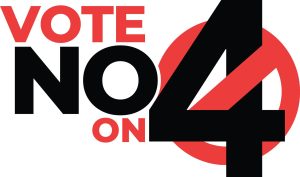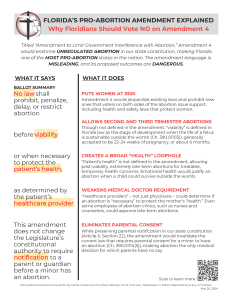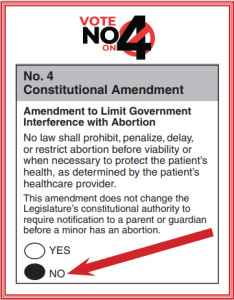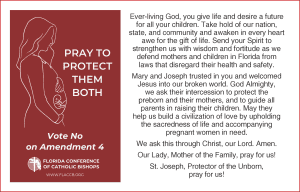The Church’s Role in Matters of State
By Karen Barry Schwarz, Special to the Florida Catholic
Some have said that the Church has no place in politics, and it is true that the Church is non-partisan and would never presume to tell you for whom to vote. However, the Church plays an important role here, which is not only to encourage the faithful to carry out their responsibilities in political life, but to help them to do so regarding the issues.
Bishops, aided by priests, deacons, and lay ministry, must share pertinent Catholic Social Teaching and guidance on the moral dimensions of the issues of the day, particularly involving public decisions with real and lasting consequences. Church Teaching and Mission, such as the defense of human life, the innate dignity of every human being, and dignity and the protection of the weak and vulnerable, must be shared, and advanced. These are but a few examples of what must be defended.
 History of the Catholic Church and The State
History of the Catholic Church and The State
The close relationship between the Catholic Church and the state has a long history, dating all the way back to the year 494. In the document Famuli Vestrae Pietatis, written by Pope Gelasius I to the Emperor, the Pope expresses that the Church and the state should work together in society, and that the state should recognize the Church’s role in society, with the Church holding superiority in moral matters, and the state in temporal matters.
More recently, the 1965 Pastoral Constitution on the Church in the Modern World (Gaudium et spes, “Joy and Hope”), points out that “the Church has always had the duty of scrutinizing the signs of the times and of interpreting them in the light of the Gospel.” Here the Church not only recognizes but also encourages the role of the laity in the life of the Church in the secular world, viewing the laity as much-needed agents of change in order to bring about a transformation of society more in line with Catholic teaching.
Catechism of the Catholic Church
The obligation to participate in political life is rooted in our Catholic Catechism, and in our baptismal commitment to follow Jesus Christ and to bear Christian witness in all we do.
The Catechism of the Catholic Church states:
- It is necessary that all participate, each according to his/her position and role, in promoting the common good. This obligation is inherent in the dignity of the human person . . . As far as possible citizens should take an active part in public life (CCC 1913-1915).
- The social duty of Christians is to respect and awaken in each man/woman the love of the true and the good . . . Christians are called to be the light of the world. Thus, the Church shows forth the kingship of Christ over all creation and in particular over human societies (CCC 2105).
Forming Consciences for Faithful Citizenship
To facilitate the Church’s role in shaping a moral society and getting involved in the issues of our time, the U.S. Bishops offer a teaching document to guide Catholics in the exercise of their rights and duties as participants in our democracy, Forming Consciences for Faithful Citizenship (https://www.usccb.org/offices/justice-and-peace/forming -consciences-faithful-citizenship).

“The obligation to teach the moral truths that should shape our lives, including our public lives, is central to the mission given to the Church by Jesus Christ. Moreover, the United States Constitution protects the right of individual believers and religious bodies to participate and speak up without government interference, favoritism, or discrimination. Indeed, our Church’s teaching is in accord with the foundational values that have shaped our nation’s history: ‘life, liberty, and the pursuit of happiness,’” the guide explains.
From Bishop Frank J. Dewane
“The Church’s obligation to participate in civil discourse is a basic part of the mission we have received from Jesus Christ, who offers a vision of life revealed to us in Sacred Scripture and Tradition,” explains Bishop Frank J. Dewane. “As such, standing for, or against, issues that support or undermine Catholic values is a responsibility of all people of faith, including clergy. This kind of political participation reflects the social teaching of our Church and the best traditions of our nation.”
Bishop Dewane points to this election year, and specifically the dangerous and misleading pro-abortion amendment, Amendment 4, as things that should be top of mind for all Catholics in Florida right now.
“It is my hope that you will receive your Parish’s guidance regarding the issues of the day with an open heart, and an open mind, and that you will let your conscience guide your voting decisions this fall,” said Bishop Dewane. “Specifically, I hope you will vote no on the dangerous pro-abortion Amendment 4! When confronted with issues that represent a threat to our shared Catholic values, the Church must not be silent and simply cannot remain on the sidelines.”
Prayer
May God bless you as you consider and pray over your voting decisions in this Election Year. May God bless our nation with true wisdom, peace, and mutual forgiveness, that we may decide together, through our democratic processes, to uphold the dignity of life and the common good. Amen.
“You are the light of the world.” (Matthew 5:1)







 Amendment 4 is an extreme proposal, essentially allowing abortion at any time for any reason, completely and dangerously unregulated. Since abortion is already legal in the state, with exceptions allowing access to abortion in a multitude of circumstances, this amendment to our state constitution is unnecessary, and has caused some confusion among Floridians. Further, the language of Amendment 4 is misleading, open to misinterpretation, and can be confusing in itself. The truth is, Amendment 4 is not what it seems, and it’s way too extreme, even for those who believe abortion should be legal in some circumstances.
Amendment 4 is an extreme proposal, essentially allowing abortion at any time for any reason, completely and dangerously unregulated. Since abortion is already legal in the state, with exceptions allowing access to abortion in a multitude of circumstances, this amendment to our state constitution is unnecessary, and has caused some confusion among Floridians. Further, the language of Amendment 4 is misleading, open to misinterpretation, and can be confusing in itself. The truth is, Amendment 4 is not what it seems, and it’s way too extreme, even for those who believe abortion should be legal in some circumstances. Many are under the wrong general impression about Amendment 4, believing that it would simply restore Florida back to when Roe v. Wade was in effect. This is not true. The fact is that Amendment 4 goes dangerously beyond what was permitted in the Roe v. Wade ruling. It would eliminate important health and safety measures that protect women, remove parental consent for any minor seeking an abortion, and allow for abortion through the third trimester of pregnancy. Further, it would make our state one of the most pro-abortion states in the nation. Four strong reasons to vote NO on Amendment 4!
Many are under the wrong general impression about Amendment 4, believing that it would simply restore Florida back to when Roe v. Wade was in effect. This is not true. The fact is that Amendment 4 goes dangerously beyond what was permitted in the Roe v. Wade ruling. It would eliminate important health and safety measures that protect women, remove parental consent for any minor seeking an abortion, and allow for abortion through the third trimester of pregnancy. Further, it would make our state one of the most pro-abortion states in the nation. Four strong reasons to vote NO on Amendment 4!